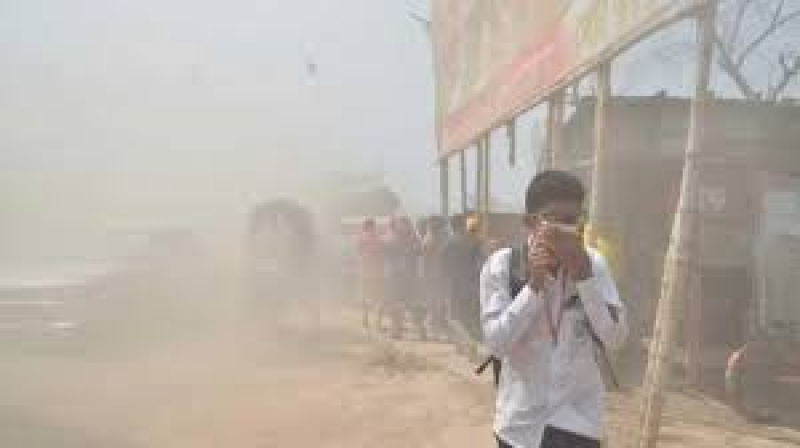- Power transfer, start of new journey for democracy: Prof Yunus |
- NCP Leaders Sign July National Charter in Dhaka |
- Tarique Rahman Vacates Bogura-6 Seat After Dual Win |
- Newly Elected MPs, Cabinet Members to Take Oath Tomorrow |
- India beats Pakistan by 61 runs as World Cup scenario heats up |
Why is air pollution going beyond our control?

Over the last decade, Dhaka has seen tremendous development in its infrastructure and economic growth. However, looking into the real cost of these developments reveals a dark reality -- the hidden costs that burden the lungs of Bangladesh.
As a developing country, much of Dhaka city is still under construction. Little to no measures are taken to control the enormous amount of air particulates saturating the ambient air. At this rate, the future appears grim with the gray sky looming overhead. The air, laden with dust particles, is choking our lungs and shortening our life expectancy by an alarming 6.8 years.
Statistically, the world has lost more people to air pollution than car accidents. According to the World Bank, about 20% of all premature deaths occurring in Bangladesh are attributed to air pollution. The government is passively suffering from 4 to 5% of GDP loss as the annual healthcare budget has increased.
While air pollution is evident to many, its causes remain mostly unknown. The unplanned rapid development and urbanization restricted the upward movement of air and confined the pollution within the city. This poor air quality can further degrade significantly during the winter. This is why we see so many articles highlighting Dhaka's extremely poor air quality in the winter seasons.
During the winter, the colder air near the surface is capped by the warmer air above. The dry and dense cold air refrains the air particles from moving and dispersing. Air pollution in winter remains in place for much longer and, therefore, is breathed in at a higher rate than during the summer. Moreover, our tropical monsoon climate used to call for heavy rainfalls throughout various times of the year. This creates the wet deposition effect where the particles in the ambient air are forced down due to gravity and rainfall.
Unfortunately, climate change has resulted in drastic changes in the rainfall pattern, making our dry seasons even drier. As a result, the “wet deposition” phenomenon is not as effective as it used to be, frequently causing haze outbreaks in the winter. While vehicular emissions and dust and debris from construction and demolition dominate the outdoor air; indoor air pollutants remain confined within houses as doors and windows remain shut during the winter. The poor ventilation, coupled with the increased use of gas stoves, solid fuels and infiltration from outdoors, further contributes to the significant degradation of indoor air quality.
Beyond all the local sources of air pollution lies significantly large transboundary pollution sources that often go unnoticed. Although air quality is significantly poor in the winter, transboundary air pollution further drives the Air Quality Index (AQI) standards up to “unhealthy” and even “hazardous” levels. As the wind direction shifts with the season, polluted air mass crosses borders. As a low-lying country, Bangladesh frequently becomes the victim of transboundary air pollution from India, Pakistan and several other countries in the Indo-Gangetic Plain (IGP), especially during the winter when the wind blows into Bangladesh through the North and North Western regions. Although very few journal articles and reports emphasize this issue, according to them, our neighbouring countries are responsible for a staggering percentage of about 40% of the total air pollution in Bangladesh.
Climate injustice is a major global conflict that has plagued the vulnerable countries of the world for several generations. The lack of international policies and laws protecting vulnerable and suffering nations from transboundary air pollution proves that it is, indeed, a losing battle. However, although nearly not enough, Bangladesh receives quite a sum of international funds to help support its fight against air pollution.
From 2017 to 2020, Bangladesh reportedly received about 17% of the world's funds in several phases, accumulating up to $2.3 billion. Yet, reports by the Clean Air Fund reveal persistent challenges and minimal improvement. The efficacy of these financial supports may be hindered by mismanagement and misguided allocation of resources.
Unlike in developed countries, the educational institutions and academics of Bangladesh take a backseat in the field of policy development. More often than not, they are equipped with outdated technologies and barely any funds to encourage and support their research activities. Effective control policies for air pollution would require the opinion and expertise of academics supported by the scientific evidence of their research, analysis, and critical thinking.
Thus, a nationwide monitoring of the air pollution network should be established immediately upon discussion with the academics and the stakeholders. Transparency and the free flow of the database in order to trace the potential causes and unknown sources of air pollutants for public awareness and changing behaviour patterns. The Aerosol Lab research group at North South University is diligently advancing relevant research activities that can contribute to developing control policies for the country.
Innovative and sustainable science-based solutions can be harvested with not only the proper allocation of funds but also with a paradigm shift and restructuring of the institutional framework. They must be prompt, responsive and pro-active, rather than reactive, to air quality and its corresponding health concerns, particularly when it deteriorates to “unhealthy” or “extremely unhealthy” and “hazardous” levels.
To rectify the current impasse, a holistic and multidisciplinary collaborative approach is required to address the dire situation of air pollution. It is a battle that must be fought unitedly, with collective minds, will, and wisdom, guided by science.

